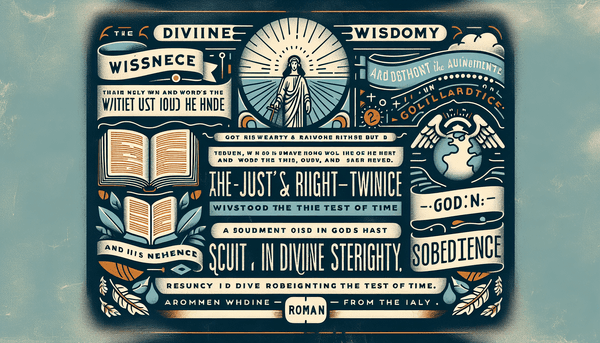Finding Peace in God
Seeking peace in a tumultuous world often leads us to the doorstep of the divine. The Bible instructs us in Philippians 4:6-7 to not be anxious about anything, but instead, to bring our worries to God in prayer with thanksgiving. This act of surrender allows the peace of God, which transcends all understanding, to guard our hearts and minds in Christ Jesus. Similarly, 1 Peter 5:7 encourages us to cast all our anxiety on Him because He cares for us. This peace is further echoed in Matthew 11:28-30, where Jesus invites those who are weary to find rest in Him. This rest is not merely a cessation of activity but a state of tranquility that comes from trusting in God's providential care. As we learn to rely on Him and His promises, like the assurance of peace found in John 14:27 and the steadfast peace promised in Isaiah 26:3 to those whose minds are steadfast because they trust in Him, we begin to experience a life unburdened by the weight of our own concerns.
The Significance of Brotherly Relationships
The Bible places great emphasis on the relationships we cultivate with our siblings, recognizing the profound bond that can exist between brothers, especially during challenging times. Proverbs 17:17 reveals that a brother is born for adversity, suggesting that the support and companionship of siblings are invaluable during life's trials. Furthermore, the New Testament highlights the critical role of reconciliation and forgiveness, with Jesus teaching in Matthew 18:15 that if a brother sins against us, we should address it with them privately, striving to regain that brother. This approach underscores the importance of love and unity within the family unit. The first epistle of John, in 4:20-21, makes it clear that loving God is inextricably linked to loving our siblings: claiming to love God while hating a brother or sister is contradictory. This passage underlines the inseparable connection between our love for God and our love for others, which includes our family and neighbors, as seen in the familial bond between Cain and Abel in Genesis 4:9 and the unity among kindred spirits in Psalm 133:1.
God's Unconditional Love and Signs of His Existence
The Bible is replete with affirmations of God’s unwavering love for us, assuring us that nothing can separate us from His love as stated in Romans 8:38-39. This assurance is a cornerstone of faith, offering comfort and hope in the knowledge that God’s love is constant. The scriptures encourage us to actively pursue a deeper understanding of God, promising that those who seek will find, as reflected in Matthew 7:7-8. The Gospel of John assures us of a future hope, with Jesus promising in John 14:1-3 that He is preparing a place for us, and His guidance is ever-present. Jeremiah 29:13 assures us that when we seek God with all our heart, we will find Him. This is a promise of discovery and connection for those who earnestly look for the signs of God’s presence. Hebrews 11:6 states that faith is the assurance of things hoped for, the conviction of things not seen, and that without faith it is impossible to please God, for whoever would draw near to God must believe that He exists and that He rewards those who seek Him. These verses together paint a picture of a loving, accessible God who invites us into a relationship with Him, marked by trust and the pursuit of His presence.
Conclusion
The teachings of the Bible provide an enduring beacon for those navigating the complexities of life. They offer a blueprint for cultivating a deep and meaningful relationship with God, fostering connections with others, and living with the confidence that comes from understanding divine truth. As we reflect on these biblical themes, we are reminded of the peace that comes from trusting in God's care, the freedom found in living for His approval, the importance of familial bonds, and the mandate to love without boundaries. These principles serve as guiding lights, leading us to a place of tranquility, purpose, and fulfillment in our spiritual walk. Let us take these teachings to heart, allowing them to shape our lives and interactions with the world around us, as we continue our journey of faith and discovery.






